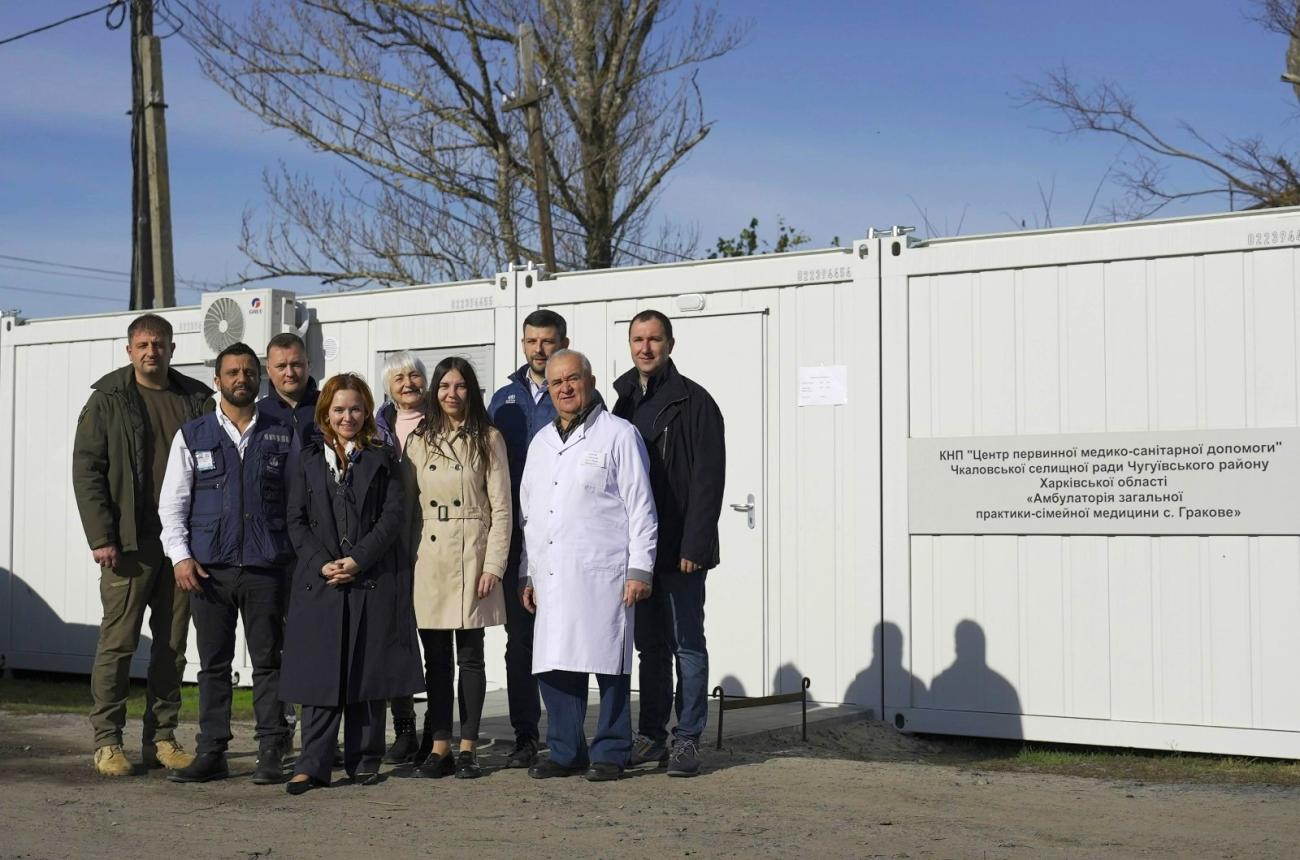WHO and Ukraine’s Ministry of Health open new primary health care clinics in frontline communities of Tsyrkuny and Hrakove

Modular structures replace destroyed or irreparable primary health care centres
The ongoing war continues to bring daily destruction to communities across Ukraine, severely impacting the country’s health care sector, and disrupting essential primary health care services near the frontline. Health care facilities have been gravely affected, with over 1,300 attacks on health care recorded by WHO since 24 February 2022.
To ensure continued access to primary health care services in areas where facilities have been destroyed or become irreparable, WHO is installing modular primary care clinics in partnership with the Ministry of Health of Ukraine.
The pilot project includes fifteen facilities in total, all replacing previously destroyed primary health care clinics in hard-to-reach communities near the frontline. The project began in July and eight facilities have been opened so far. Earlier today, Maryna Slobodnichenko, Deputy Minister of Health for European Integration along with a WHO team visited two newly opened clinics in the villages of Tsyrkuny and Hrakove in the Kharkiv Oblast.
"Thanks to strong support and cooperation with WHO and other international partners, we manage to restore healthcare facilities and to provide patients with high-quality and affordable services despite extremely difficult times. The installation of modular primary health care clinics in such villages as Tsyrkuny and Hrakove will provide residents with access to necessary medical care and will quickly solve the problem in the region now," said Maryna Slobodnichenko, Deputy Minister of Health.
The newly installed clinic in Tsyrkuny will be staffed with three doctors and open six days per week, serving a community of over 3,700 people. This is a large structure, consisting of eight prefabricated modules connected to make a fully functional medical facility. The original outpatient clinic in this village was fully destroyed as a result of the Russian Federation’s shelling in the spring of 2022.
The outpatient clinic for general practice and family medicine in the village of Hrakove is similarly replacing a prior dispensary destroyed by shelling in 2022. It will be staffed with one doctor and two nurses – the same personnel that worked in the original facility, ensuring continuity of care. This clinic will be open to patients five days per week. This is a smaller clinic, consisting of five prefabricated modules, which will serve a community of 300 people.
To allow for additional security given the proximity to the contact line, WHO has equipped both facilities with a dedicated shelter located nearby that can provide a safe haven for ten people at a time.
“Modular primary care facilities are incredibly nimble health-care units that can be quickly installed on the spot. These units are one of WHO’s key projects for response and recovery to ensure residents of rural communities and those returning home can continue accessing much needed care. While they are ultimately a temporary solution, they are essential to bolstering trust in the health care system and can serve as replacements for damaged facilities for up to 10 years,” noted Dr. Emanuele Bruni, WHO Ukraine Incident Manager.
Modular clinics can be assembled and installed within just 10–14 days each, using a varying number of prefabricated modules, depending on the required number of patient rooms. All clinics are equipped with essential amenities, including electricity, sanitary facilities, sewage systems, waiting rooms and patient examination rooms. Generators and fans are provided to maintain an optimal environment for health-care delivery.
The project is generously sponsored by the Ukraine Humanitarian Fund (UHF) and the Directorate-General for European Civil Protection and Humanitarian Aid Operations (DG ECHO).

